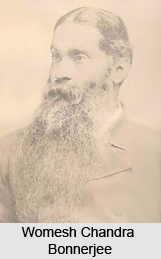 Womesh Chandra Bonnerjee (or Umesh Chandra Banerjee by current English orthography of Bengali names) was an Indian barrister and was the first president of Indian National Congress. He was the first Indian to contest the election for British House of Commons. However he lost the election. He made two unsuccessful attempts to enter the British parliament.
Womesh Chandra Bonnerjee (or Umesh Chandra Banerjee by current English orthography of Bengali names) was an Indian barrister and was the first president of Indian National Congress. He was the first Indian to contest the election for British House of Commons. However he lost the election. He made two unsuccessful attempts to enter the British parliament.
Early Life of Womesh Chandra Bonnerjee
Womesh Chandra Bonnerjee was born on December 29, 1844 at Calcutta (now Kolkata), in the present-day state of West Bengal in an upper middle class Bengali Hindu Kulin Brahmin family of considerable social standing. His father Grees Chunder was an attorney at the Calcutta High Court. He studied at the Oriental Seminary and the Hindu School. In 1859, he married Hemangini Motilal. Following his family tradition, he studied law (at the Middle Temple, London) and later became very successful as a lawyer. While he was in London, he helped in the formation of the London Indian Society, which later integrated with the East India Association. Thus, even while he was in London, he championed the cause of his country and his countrymen.
Career of Womesh Chandra Bonnerjee
His career began in 1862 when he joined the firm of W. P. Gillanders, Attorneys of the Calcutta Supreme Court, as a clerk. In this post he acquired a good knowledge of law which greatly helped him in his later career. In 1864 he was sent to England through a scholarship from Mr. R. J. Jijibhai of Bombay where he joined the Middle Temple and was called to the Bar in June, 1867. On his return to Calcutta in 1868, he found a patron in Sir Charles Paul, Barrister-at-Law of the Calcutta High Court. Another barrister, J. P. Kennedy, also greatly helped him to establish his reputation as a lawyer. Within a few years he became the most sought after barrister in the High Court. He was the first Indian to act as a Standing Counsel, in which capacity he officiated four times. In 1883 he defended Surendranath Banerjee in the famous Contempt of Court Case against him in the Calcutta High Court.
After returning to India, Bonnerjee played a pioneering role in the formation of the Indian National Congress. He was its first President and as such, presided over its first session in 1885. In 1891, he was once again chosen as the Congress President. As a politician, Bonnerjee held a moderate approach. If on one hand, he strongly condemned the anti-India policies of the British, on the other he also acknowledged the benefits India enjoyed from its association with Britain. He wanted the British to provide the "same facilities of national life that exist in Britain" to Indians. Further, he was in favour of western education for his countrymen.
He presided over the first session of the Indian National Congress held at Bombay in 1885. In the 1886 session held at Calcutta, under the presidency of Dadabhai Naoroji, he proposed the formation of standing committees of the Congress in each province for the better co-ordination of its work and it was on this occasion that he advocated that the Congress should confine its activities to political matters only, leaving the question of social reforms to other organisations. He was the president of the Indian National Congress again in the 1892 session in Allahabad where he denounced the position that India had to prove her worthiness for political freedom. He founded East India association in 1865.
In his personal life too, Bonnerjee had an unorthodox attitude towards various aspects of life, especially religion and social customs. He advocated widow remarriage, abolition of child marriage etc.






